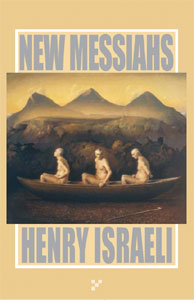
paper • 60 pages • 14.95
ISBN-10: 1-884800-35-1
THE BICYCLE RIDE
In the country of confusion my father
passes by clumsily on a three-speed
unaware of the state he inhabits.
You might say he’s confused, and mistakes
long silences for the luscious drone
of an angel’s wing sweeping overhead.
You might say he cannot focus on
confusion, that he rides along the sunny
streets of disorientation as if he were
gliding over them, an insect following
the ancestral scent to the cave.
I wave and he nods a little, lowering
his chin. Think of me, I think aloud,
hoping he registers the amplification
and frequency somewhere along the ride.
Don’t worry, I hear him call out,
I know this country well. How could you,
I ask. How could you.
He jerks the handlebars right and left
and turns out of sight. All night I invent
dreams of betrayal and loss,
where at the end of the road the inexplicable
divides from the unexplained,
and the ringing of my father’s little bell
stops the traffic cold.
“All in this book: our lives from hour to hour, the memories that define us, redemption…. But in the end the question still remains: ‘Who will come to bury / he who comes to bury me?’ Powerful, crystal clear, intimate and world building, this book is testimony and proof that the miracle of our lives will continue. ‘New Messiahs’ is the right title.” —Tomaz Salamun
“In Henry Israeli’s debut book, we are still on the infamous train of the twentieth century, there’s no getting off, and we’re all responsible and helpless. Thankfully, however, these poems are noble memories of transformations; they allow that we are made of ‘little bones that contemplation holds together.’ How the spirit carries the wounded body around in here! You can feel the wind rage, feel yourself tested.” —Jane Miller
“Israeli is visceral and brilliant, intransigent in his doubts. His poems lead deeper into the wilderness toward the human, the ambivalent, the paradox Dorothy Day called ‘a hard and dreadful love.'” —D. Nurkse